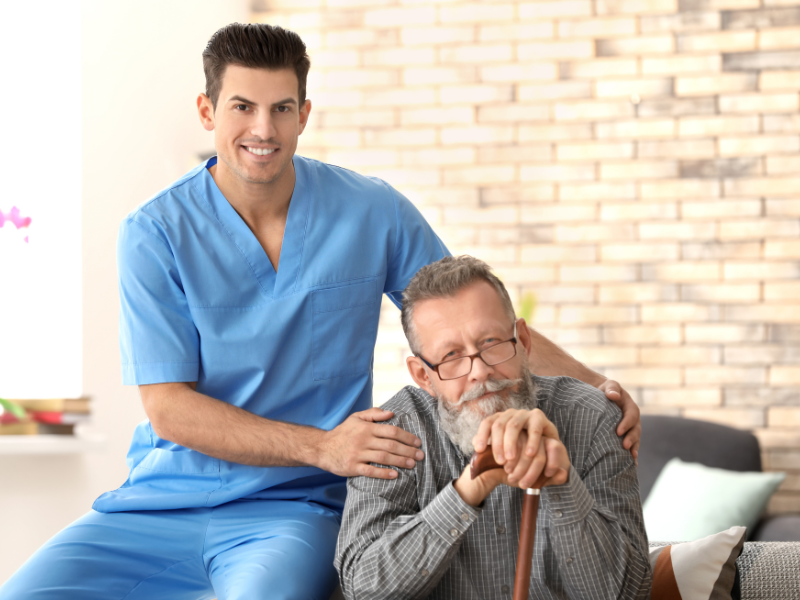13 Tips for Improving Senior Men’s Health in Illinois

Author: Home Helpers Home Care
Father’s Day is celebrated on the third Sunday of June each year so it stands to reason that June
would be recognized as Men’s Health Awareness Month.
This awareness theme is very important because men are notorious for minimizing their health
as a priority, even though that’s ill-advised.
Health in Aging says, “Experts agree that by taking better care of themselves, men can increase
their odds of living healthier, longer lives.”
The following are 13 tips for improving senior men’s health I’d like to share for the betterment
of “mankind.”
13 Tips for Improving Older Men’s Health
• See your healthcare provider regularly. Get an annual checkup with your Primary Care
Provider.
• Call or see your healthcare provider when you’re feeling sick. “Prompt medical care
can make a big difference – sometimes, the difference between life and death. Don’t
wait!”
• Take medications, vitamins, and supplements only as directed. Always check with your
PCP or pharmacist before taking new medications, vitamins, or supplements to ensure
your safety. Take all medications as directed and report any side effects you experience
to your PCP.
• Get recommended vaccinations. If you’re not a vaxer, disregard this tip. Otherwise, the
CDC recommends that you check with your healthcare provider to make sure you are up
to date on your flu shot, shingles vaccine, tetanus/diphtheria booster, and Pneumonia
vaccination.
• Use sunscreen. Aging skin is more susceptible to sun damage, increasing the risk for skin
cancer. Also, consider wearing a wide-brimmed hat for added protection.
• Lower your risk of falls and fractures. Be sure to get plenty of bone-healthy calcium and
vitamin D daily. Talk to your healthcare provider about how much vitamin D you need.
Do weight-bearing and bone-building exercises such as walking and jogging.
Weightlifting and other strength training exercises are also good for your bones. If
you’ve fallen in the past, ask your healthcare provider about local exercise programs
that include strength training as well as balance, flexibility, and stretching exercises.
• Don’t smoke or quit if you do. Talk to your healthcare provider about ways to help you
stop smoking. For additional help, call 1-800-QUIT NOW or visit Healthfinder.gov.
• Eat properly. Later in life, you still need to eat healthy foods, though you need fewer
calories. The USDA’s website Choose My Plate can help you and your healthcare
provider choose healthy dietary options.
• Exercise your brain. Make sure to challenge your brain by trying new things and playing
against the clock rather than just repeating the same exercises. Join a book or discussion
club. Sign up for a class at the local library, senior center, or community college (some
offer free classes for older adults). Do word, number, or jigsaw puzzles – whatever
interests you.
• Exercise your body. Regular exercise is important for good health no matter how old
you are. In conjunction with a healthy diet, exercise helps you reach and maintain a
healthy weight. It tones up your heart, circulation, and muscles; strengthens bones;
boosts brain function; lifts your mood; and can help prevent and ease depression.
• Drink alcohol in moderation. Check with your healthcare provider to make sure that
drinking alcohol in light or moderate amounts is right for you. For older men, moderate
drinking means no more than 3 drinks a day or 7 drinks total in a week. One drink
consists of 12 ounces of beer, 5 ounces of wine, or 1.5 ounces of hard liquor).
• Spend time with others. Spending time and doing things with other people of all ages
can help keep you mentally, physically, and emotionally fit. It can also give your brain a
boost and lift your mood.
• Get checked out. Screening or checking for early signs of certain health problems can
help diagnose them early. These include a bone health evaluation; blood pressure
check; cholesterol test; diabetes check; prostate and colorectal cancer screenings;
hearing and vision screening; depression screening; abdominal aortic aneurysm
screening; dental check-ups; sexually transmitted disease screening; and a discussion
about sexual concerns; and other screenings recommended by your healthcare
provider.
Our team of compassionate caregivers at Home Helpers is available 24/7/365 to assist senior
men by providing in-home care services to support independence and a healthier quality of life.
In addition, our senior clients receive safe transportation assistance to doctor appointments
and health screenings, activities within the community, and so much more to make life easier
while striving to achieve specific health goals.
I encourage senior men who could benefit from the help of a highly skilled caregiver, to take
advantage of a FREE Assessment to discuss specific needs and create a personalized care plan
reflecting the many ways we can help.
Home Helpers® Bourbonnais/Kankakee/Frankfort proudly serves male and female seniors,
Veterans, and the differently abled in Beecher, Bourbonnais, Bradley, Dwight, Frankfort,
Kankakee, Manteno, Mokena, New Lenox, Orland Park, Palos Heights, Palos Hills, Tinley Park,
Watseka, Wilmington, and surrounding areas. Contact me today to learn more about the many
services offered through Home Helpers® - We are Making Life Easier℠ for you and yours!
815.427.4238
Source:
